Kingston SSDNow V+100 Review
by Anand Lal Shimpi on November 11, 2010 3:05 AM EST- Posted in
- Storage
- SSDs
- Kingston
- SSDNow V+100
Overall System Performance using PCMark Vantage
Next up is PCMark Vantage, another system-wide performance suite. For those of you who aren’t familiar with PCMark Vantage, it ends up being the most real-world-like hard drive test I can come up with. It runs things like application launches, file searches, web browsing, contacts searching, video playback, photo editing and other completely mundane but real-world tasks. I’ve described the benchmark in great detail before but if you’d like to read up on what it does in particular, take a look at Futuremark’s whitepaper on the benchmark; it’s not perfect, but it’s good enough to be a member of a comprehensive storage benchmark suite. Any performance impacts here would most likely be reflected in the real world.
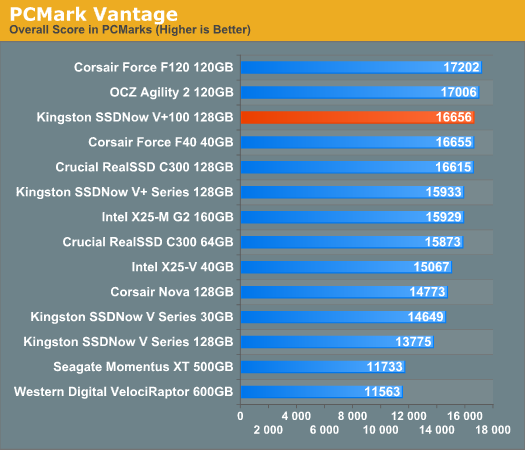
The SSDNow V+100 does very well here. Overall performance is in the top 3, higher than we’ve ever seen Kingston reach. In fact throughout the PCMark Vantage suite you'll see the SSDNow V+100 do very well. In some areas it's the fastest drive of the bunch (by a hair), while in others it's more of an average performer.
The Corsair Force F40 is the highest performing low capacity drive as you'd expect, beating out even the Intel X25-M G2. The 64GB C300 isn't too far behind however.
The memories suite includes a test involving importing pictures into Windows Photo Gallery and editing them, a fairly benign task that easily falls into the category of being very influenced by disk performance.
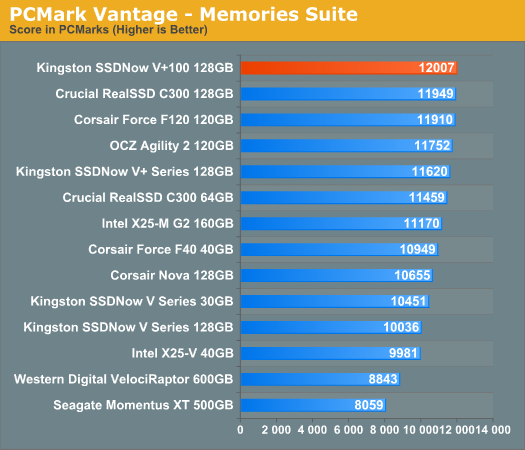
The TV and Movies tests focus on on video transcoding which is mostly CPU bound, but one of the tests involves Windows Media Center which tends to be disk bound.
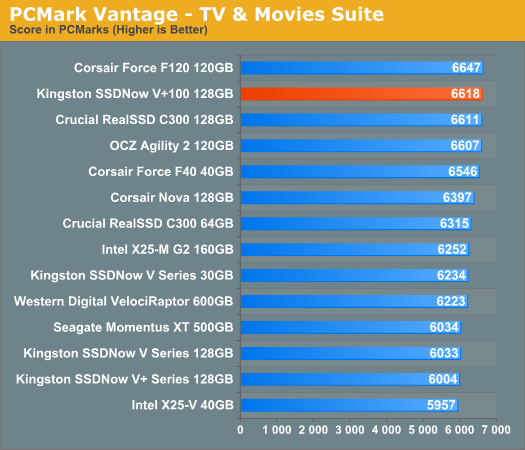
The gaming tests are very well suited to SSDs since they spend a good portion of their time focusing on reading textures and loading level data. All of the SSDs dominate here, but as you'll see later on in my gaming tests the benefits of an SSD really vary depending on the game. Take these results as a best case scenario of what can happen, not the norm.
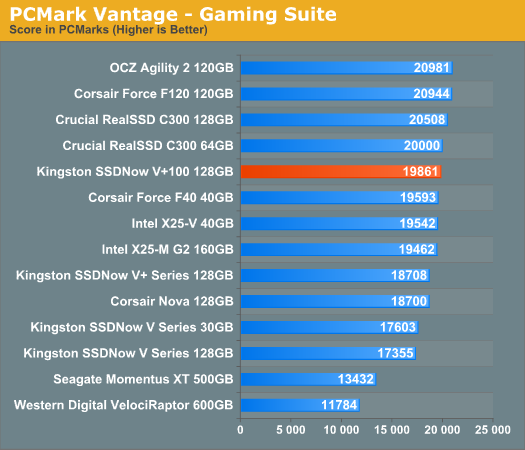
In the Music suite the main test is a multitasking scenario: the test simulates surfing the web in IE7, transcoding an audio file and adding music to Windows Media Player (the most disk intensive portion of the test).
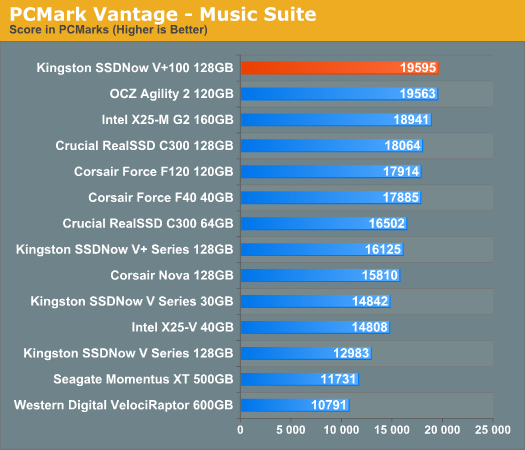
The Communications suite is made up of two tests, both involving light multitasking. The first test simulates data encryption/decryption while running message rules in Windows Mail. The second test simulates web surfing (including opening/closing tabs) in IE7, data decryption and running Windows Defender.
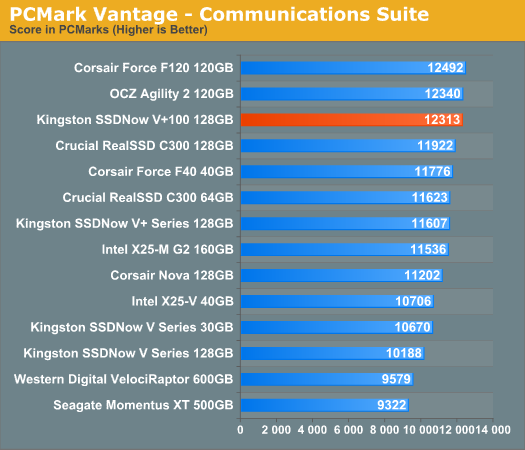
I love PCMark's Productivity test; in this test there are four tasks going on at once, searching through Windows contacts, searching through Windows Mail, browsing multiple webpages in IE7 and loading applications. This is as real world of a scenario as you get and it happens to be representative of one of the most frustrating HDD usage models - trying to do multiple things at once. There's nothing more annoying than trying to launch a simple application while you're doing other things in the background and have the load take forever.
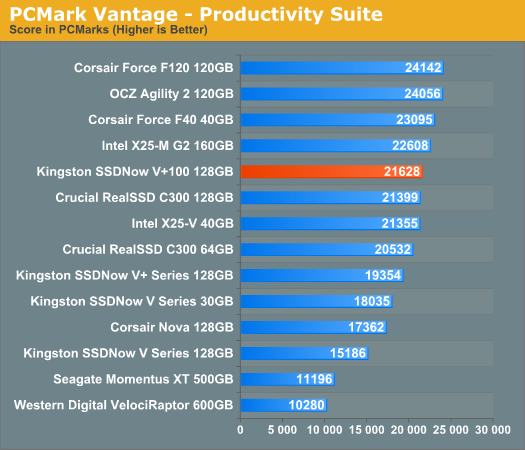
The final PCMark Vantage suite is HDD specific and this is where you'll see the biggest differences between the drives:
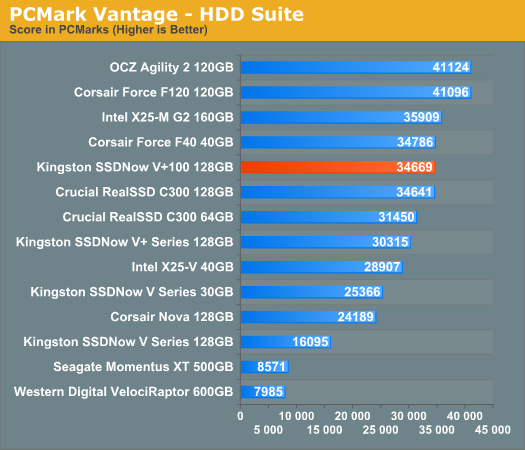
For pure I/O the SSDNow V+100 is good but not the best. Overall performance, as we've seen above looks to be pretty decent however. Let's keep going.










96 Comments
View All Comments
melgross - Thursday, November 11, 2010 - link
So, with all of this info presented, which drives would be best as a Photoshop scratch drive?Out of Box Experience - Tuesday, November 16, 2010 - link
Any modern platter based drive should be fine for a photoshop scratch driveKlober - Thursday, November 11, 2010 - link
This is my perspective from what I see throughout the review:The Corsair Force drives and the Crucial RealSSD drives are very close performance-wise in most of the comparisons; however, when price is included in the scenario the Corsair Force drives (60GB/120GB) win hands down.
The only true advantage the C300 has over the Force drives from what I can tell is in scenarios where the data is mostly uncompressible - I don't think this comes close to making up for the price disadvantage of the C300 drives since most likely users will have a large mechanical drive for their storage drive rather than opting to use their C300 for that purpose.
Taking into account the fact that you can get the Corsair Force 60GB SSD for $5 more than the 40GB at NewEgg, I would say that pretty much nullifies the cost/GB advantage of the C300 at the lower capacity - at that point you're looking at $2.109/GB for the C300 and $2.031/GB for the Force 60GB assuming it has 64GB NAND capacity (that's going by dividing the Force 120GB specs in half...if we instead use the specs from the Force 40GB that would put the Force 60GB at an amazing $1.805/GB for a low capacity SSD!).
If I were to buy an SSD tomorrow it would almost definitely be the Corsair Force 60GB for its fantastic (at least by SSD standards) cost/capacity at a low price point.
Anyway, that's my 2 cents!
Aikouka - Thursday, November 11, 2010 - link
Why are you assuming the Corsair drive magically has more space than it actually lists? If it's a 60GB drive, then you only get 60GB of usable space with some other amount set aside as a scratch area.Personally, I base my purchases more on random read than anything. Based on the prices, I'd most likely pick up the Crucial C300 64GB if I was looking for a new boot drive.
7Enigma - Thursday, November 11, 2010 - link
Just a simple request for a G2 80gig Intel drive for future reviews. I think many of us have one of these and know the 160gig drive is significantly faster in some tests (sequential write), but almost identical in others (random read I believe).DanNeely - Thursday, November 11, 2010 - link
Are there any tools available that will let you see how much of the write capacity of an SSD you've exhausted?Iketh - Thursday, November 11, 2010 - link
i own an intel 40gb and intel's trim software reports it... it's part of a drive's SMART data, so any SMART reading program should be able to tell you, but i could be mistakenMadMan007 - Thursday, November 11, 2010 - link
"Note that not all SandForce drives are created equal here. If a manufacturer doesn’t meet SandForce’s sales requirements, their drives are capped at a maximum of 50MB/s here. This is the case with the Patriot Inferno, although OCZ’s Agility 2 voluntarily enforces the limit."I understand there is the 'higher performance' Sandforce firmware (Vertex 2 vs Agility 2 for example) and the Agility 2-type firmware is the one that gets 'capped,' but what exactly do you mean by 'meet Sandforce's sales requirements'? Is this to say that the firmware the retail companies are licensed to use and able to ship is restricted based upon sales figres/order quantity, so that if say OCZ buys 100k SF controllers while Patriot only buys 10k, Patriot is limited in which firmware they are allowed to offer? If it's not that, what exactly do you mean? And most importantly how can we as end-users making a purchase determine this difference, is looking at IOPS all that's needed?
7Enigma - Thursday, November 11, 2010 - link
Anand,I didn't like the wording of the power consumption in terms of not being better at load than a mechanical hard drive. Just like your praise of Intel's hurry up and get idle (with turbo), all of these SSD's have an advantage in bursting and then getting idle.
I had mentioned it in a previous SSD article but what we really need is a moderated workload suite. Something like virus scan and total power draw during that time. While load voltages might be the same or higher for the SSD's, the total power consumption during that time will (should) be less. I think a virus scan is perfect on a normal system as it should take 10-20min and give a measureable difference between drives. Grab a laptop from one of your recent reviews (not an Atom or other super-slow mobile to prevent the SSD from waiting around), and measure the total power drawn over the scan.
This is less important in a desktop obviously but for the mobile crowd (whom sees the biggest benefit over the traditional laptop drives anyway) might just be one more criteria to help make a decision (or just show that it's the type of drive (mech/SSD) and not really differences between the SSD's themselves).
Glad to have a new SSD review though. I love reading these and am trying to justify upgrading from my 80gig Intel G2 drive that has been fantastic for the last year. The great thing about the SSD tech is that you can hand-me-down smaller capacity, slower drives and completely revolutionize an older system.
Thanks again.
JohnBooty - Thursday, November 11, 2010 - link
"Kingston ships the V+100 with a 3-year warranty and to Kingston's credit I haven't had any other drives die as a result of wearing out the NAND. Even if the V+100 has higher effective write amplification than the competition, your usage model will determine whether or not you bump into it."Anand,
Firstly, thank you for being the industry standard when it comes to articles about SSD. It's a favorite topic of mine and your articles have steered a lot of purchases in my personal and professional circles (and you haven't steered us wrong!)
My request...
One of the lingering questions about SSDs is how long they'll actually last in the real-world before the NAND is fried. When I see you mentioning that you've never actually fried any NAND, that seems like an opportunity for you to give it a shot and give the public some answers.
I'd love to see a "torture test" article where you run simulated workloads against SSDs 24/7 until they can't take any more writes, and report on the results.